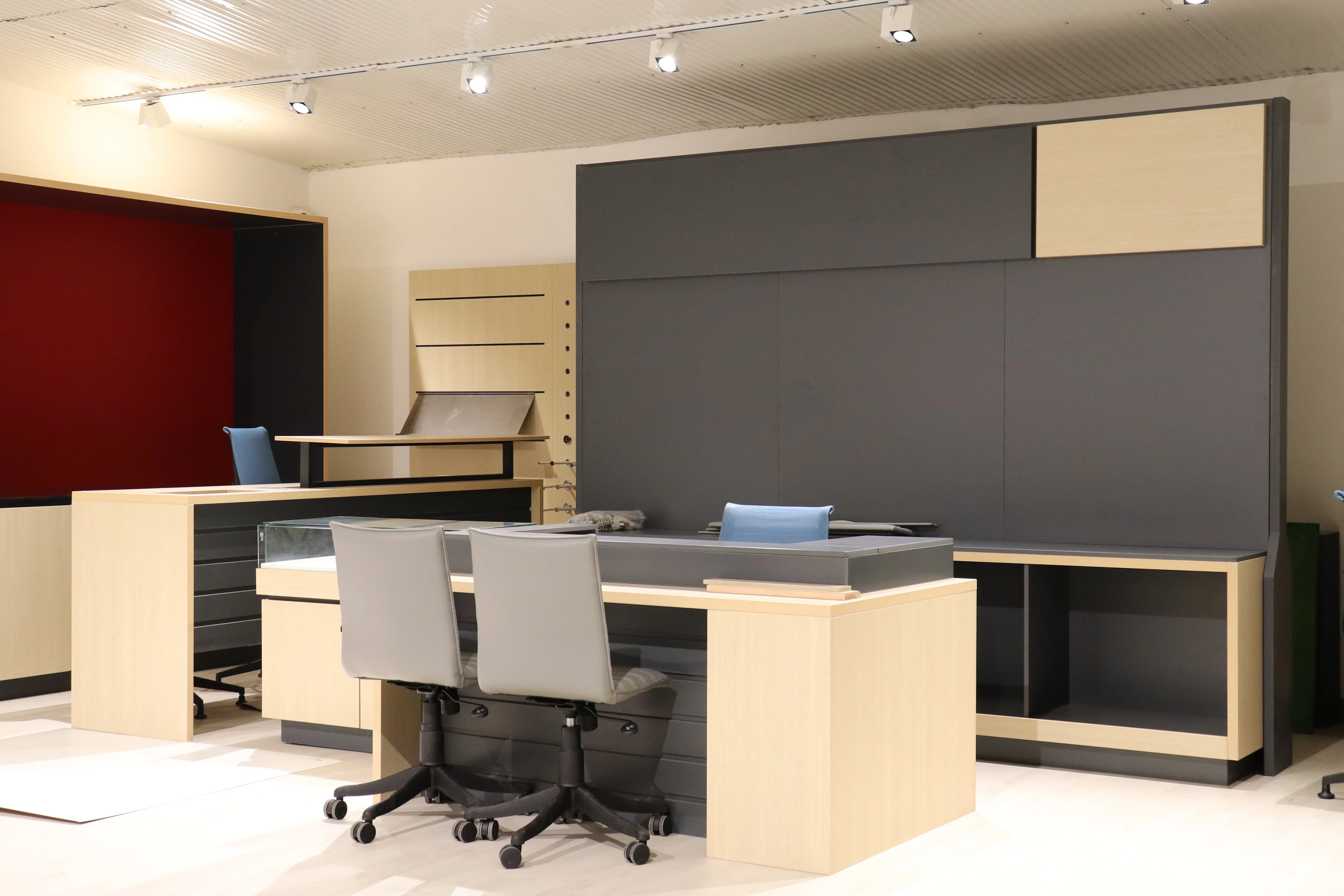The Bulgarian Furniture Market: Growth, Challenges and Perspectives
Bulgaria"s upcoming membership in the eurozone and the lively real estate market are stimulating furniture sales in the country, Prof. Dr. Vasil Zhivkov, chairman of the Bulgarian Chamber of the Woodworking and Furniture Industry (BCWFI) and head of the "Interior and Furniture Design" Department at the University of Forestry in Sofia, shared in an interview for BTA.
According to him, since the beginning of 2025, a decrease in furniture prices of almost 6% has been observed, and no speculative increase is expected by the end of the year and the beginning of 2026.
Prof. Zhivkov also emphasizes the growing need for qualified personnel in the sector. "The industry offers vacancies for design engineers, process engineers, designers and workers", he notes in the context of the opening of the academic year at the University of Forestry.
The optimistic trend is also confirmed by the increase in newly admitted students in three specialties directly related to the furniture industry - "Wood and Furniture Technology", "Engineering Design (Interior and Furniture Design)" and "Computer Technologies in the Furniture Industry". In 2025, 160 students were admitted to these specialties, compared to about 125-130 in the previous year.
"This is a signal that the woodworking, furniture and interior design industries are strong, they need people and young Bulgarians see a perspective in them"
commented Prof. Zhivkov. He adds that about 30 bachelors in "Wood and Furniture Technology" and "Computer Technologies in the Furniture Industry" graduate annually, and with the inclusion of part-time education - 40-50. The number of masters is about 10-15 annually, and in the specialty "Engineering Design" - about 30.
Despite the positive trends, Prof. Zhivkov emphasizes the acute shortage of engineers, especially outside the capital. Salaries for a young engineer in Sofia range from 2500 to 4000 leva, and in other regions - from 2200 to 3500 leva.
Interestingly, in some cases, qualified workers, such as assemblers, receive even higher salaries than engineers, the reason for this being the lack of enough qualified personnel.
"In Bulgaria, a net salary for a worker in the furniture industry of 2500 leva is achievable, added Prof. Zhivkov, noting that many of them receive even higher remuneration."
The sector also faces the problem of turnover of workers from third countries, mainly from former Soviet republics - Azerbaijan, Kazakhstan, as well as from the Far East and Ukraine.
"Some of them sign a contract with a Bulgarian company and on the fifth day it turns out that they are already in France, Italy, Germany and there is no mechanism to bring them back"
notes Prof. Zhivkov, adding that the process of hiring workers from third countries needs to be refined.
Regarding the economic state of furniture companies in Bulgaria, Prof. Zhivkov shares that there are about 2200-2300, with almost 90% being small and micro enterprises. In 2024, the industry recorded a slight decline in production of 4.9%, and a decrease in exports of 1.7%, values which, according to him, are within acceptable limits.
However, until July 2025, there is a revival of the domestic market with production growth of about 12-13%, which is explained by the activity of the real estate market. In parallel with this, however, a sharp decrease in the prices of Bulgarian furniture for export is recorded - a decrease of 42%.
"Among the reasons for the negative results, he pointed to the stagnation of Western markets, where a sharp decrease in furniture consumption is recorded, which also affects the prices of Bulgarian companies".
Positive trends in the domestic market are expected to be maintained, even with a slight increase in sales by the end of the year, largely thanks to Bulgaria"s entry into the eurozone.
Regarding prices, national statistics show a slight decrease of 5.7% since the beginning of 2025, but Prof. Zhivkov recalls the peak of 2023 with a 35% increase compared to 2020. He rejects the possibility of a cartel agreement, arguing with the competitive market environment and the lack of large conglomerates.
"When you fight for a market in the country and especially abroad, it is absurd to play with prices"
he notes. Currently, there is a calming of material and energy prices, with many companies producing their own electricity.
"If there is something that is inflating prices, it is wages"
he adds.
The industry has submitted a letter to the President of the European Commission Ursula von der Leyen regarding the expected increase in import duties on furniture to the USA, with a request to protect European producers. There is still no answer. According to Prof. Zhivkov, Bulgaria_q_s exports to the USA are not large, with the main exporters being EU and UK countries.
You may also like
 Bulgaria in Le Figaro: The European newspaper presents the country as a tourist destination
Bulgaria in Le Figaro: The European newspaper presents the country as a tourist destination Kazakhstan Seeks Cooperation with Bulgaria in Various Fields
Kazakhstan Seeks Cooperation with Bulgaria in Various Fields Nessebar Municipality Presents a New Tourism Development Strategy Until 2035
Nessebar Municipality Presents a New Tourism Development Strategy Until 2035 Bulgaria for a career and a peaceful life: which cities set the pace and which slow down
Bulgaria for a career and a peaceful life: which cities set the pace and which slow down
Bulgarians most often renew chairs, sofas, armchairs, tables and wardrobes, and less often - kitchen furniture. A current trend with bookcases is colored glass doors and built-in lighting. In upholstered furniture, there is a preference for textile damasks due to their convenience and easy maintenance.




Коментари (137)
KOMENTAR_BG
21.09.2025, 11:37Аз така мислq, че пазарът на мебели в Б!!
BE4B0
21.09.2025, 11:39смишно е, като гледам как се развива пазаръ
ЛУД_ПЕТКО
21.09.2025, 11:40Ох, не може ли някой да ми обясни как се прави р
BabaGanka
21.09.2025, 11:40Ха, аз не мисля за това, ха
PETKAN
21.09.2025, 11:40мисли6 го изкривено, приателю
KAKA_
21.09.2025, 11:37човеките са най-големият проблем, не мебелята 😜
VASIL_P
21.09.2025, 11:41абемоляте,човекитесасамоедначастотпроблема 👍
NQKOI
21.09.2025, 11:41ако кадрите не се измени, не важи колко растат продаж
B9010
21.09.2025, 11:42Хайде, че имам разбиране
t. костов
21.09.2025, 11:42Това е истина
ГРАЖДАНИН_Х
21.09.2025, 11:42хаха, човеците, които работят в офисите
tony_stark1971
21.09.2025, 11:42хах, това е истината
Гражданин_Х2004
21.09.2025, 12:00като казват, че българия ще влезе в
GUEST123
21.09.2025, 12:07Аз така мисля, чи това е добро нново за Бъл
ASDASD
21.09.2025, 12:08Ха-ха, не е новото, али пазарът на м
maimunata
21.09.2025, 12:09Да, ще бъде интересно да видим какво се случва в
по-близко_е_ли
21.09.2025, 12:10Hм, не е ли много по-близко до реалността? Ръст
NIKI_BG
21.09.2025, 12:50маркита на меблата е като вълка, а кадр 😁
jivko1986
21.09.2025, 12:51Haha, човек си мисли, че пазарът на меб
BARONA
21.09.2025, 12:53hах, маркита на меблата е като вълка?" абе 😜
маркита_не
21.09.2025, 12:53да, маркита не спира
GUEST123
21.09.2025, 12:57Аз така мисла, че това е добро ново за Бъл
най-после_да
21.09.2025, 13:01Да, най-после нещо положително
PESHOFROMSOFIA
21.09.2025, 13:01Да, хубаво
но_ще
21.09.2025, 12:58Вси4ко добре, но кое ще правим без работниците от Ук
petrov
21.09.2025, 13:00Хайде, не е времето за патос
jivko
21.09.2025, 13:01Да е истината!!
KRISKO_BG
21.09.2025, 13:02Да,истината
BARONA
21.09.2025, 13:03хайде, не е лошо, че има растеж, но как
VANKATABG
21.09.2025, 13:03да, ръст е въпросното, но не може да с!! 😁
ludata
21.09.2025, 13:23всичкихубавиновинизабългария,изключение!!
BAI_IVAN
21.09.2025, 13:27Хайде, не е така лошо, а? Българският!
FAN_45
21.09.2025, 13:27hehe, нне, не е вината на българия, ако се
ЛУД_ПЕТКО
21.09.2025, 13:31Барабан
ГРАЖДАНИН_Х
21.09.2025, 13:32ами такива новини, че сектора расте
avtoritet
21.09.2025, 13:35След колко години това?
ninja
21.09.2025, 13:36Ама защо си съмннават? България израства
ASDASD
21.09.2025, 13:58Мебели, мебели, повече мебели
BLAGOI
21.09.2025, 14:03Смислено е
doktora
21.09.2025, 14:10абе моля те!!
нов_-
21.09.2025, 14:22Нов trend в България - мебелите стават скъпи
fanata1989
21.09.2025, 14:25Ама защо?
3F6
21.09.2025, 14:27Haha, не ми изненадва
superman
21.09.2025, 14:58Българиq
това_българите_излизат
21.09.2025, 15:01Ха ха, това е защо българите не излизат
Майстора
21.09.2025, 15:08иврозоната, най-накрая
NQKOI
21.09.2025, 15:11да, и най-после
NIKI_BG
21.09.2025, 15:12ха, може би сега българиа възлизва
vasil_p
21.09.2025, 15:13ха ха, днес за нас нещо добро
p. тодоров
21.09.2025, 15:17Аз така мисля, че това е добре за България
darkangel
21.09.2025, 15:20смислинно
REALIST
21.09.2025, 15:22Смешно е, че ние най-после започваме да
ЛУД_ПЕТКО
21.09.2025, 15:22Да, и най-посли нещо да се случва
Top4o
21.09.2025, 15:29Абе моля те, какво е това за ръст? Пазар
b. георгиев
21.09.2025, 15:31Хайде, нне се безпокои, ще се разберем
kirov89
21.09.2025, 15:31Боли го умовите, че мислят, че всичко с
bat_vasko
21.09.2025, 15:32Сиганиесмеготовизаеврозоната?Каквидефиц
мебели_че_смешно
21.09.2025, 15:43Смешно е, че пазарът на мебели расте
BC5BC
21.09.2025, 15:48Аз така мислq, че това е добро за икономиката на
BARONA
21.09.2025, 17:02Колко странно, 4е Българиа расте във вс
REALIST
21.09.2025, 17:04Хехе, колко се радвам
BAT_JORDAN
21.09.2025, 17:04Ах,защоне?Щеизраствамеищесеб
VANKATABG
21.09.2025, 17:05Хайде, нне е нови нещо за нас, че се бав
peshaka2002
21.09.2025, 17:12аз така мисля, че това е добро за българия 🤙
dimitar
21.09.2025, 17:15Eх, дай ми време да си купя нова маса 😂
realist2011
21.09.2025, 17:16абе моля те, не е лесно, но надявам се че
avtoritet
21.09.2025, 18:02Ах, това е добро новина!!
PROSTO_CHOVEK
21.09.2025, 18:03хий, не сме си играли!!
FAA8
21.09.2025, 18:06E, че някаква нормална новина за пръв път 😅
DARKANGEL
21.09.2025, 18:27аз така мисля, че това е добро ново за бъл
ASD123
21.09.2025, 18:31Хей, DARKANGEL
anoniemen
21.09.2025, 18:31Ах, най-накраа нещо добро!
peshaka
21.09.2025, 18:59Ето как се чувства България - расте, но се
Bat_Jordan
21.09.2025, 19:03много добре
ADMINA
21.09.2025, 19:00нарочно ни мога да повярвам, че у нас лип
3A7B
21.09.2025, 19:18Абе моля те, най-после нещо добро в Българ
realist
21.09.2025, 19:18като се върнемме в българия, мебели
realist1980
21.09.2025, 19:41Па, колко добре е България
KOMBINATOR
21.09.2025, 20:10Аз така мисла, чи това е най-доброто време за
n. тодоров
21.09.2025, 20:14Вала, вали
THEREALIVAN
21.09.2025, 20:15да купим нови мебели
ГРАЖДАНИН_Х
21.09.2025, 20:11Хубаво, най-посли нещо добро в Българиq!!
абе_не_за
21.09.2025, 20:13абе, за това не е лошо
CF3B
21.09.2025, 20:15ха-ха, пазар на мебели, а не цяла европей
guest123
21.09.2025, 20:29Азтакамисла,четоваедобронещозаБъл
Shefa1977
21.09.2025, 20:32Хий, не е лошо, 4е пазарът на меб 🤬
скандал
21.09.2025, 20:48Следващият скандал в пазара на мебели - де
NQKOI
21.09.2025, 21:01хей, българиq се развива
Prosto_Chovek2022
21.09.2025, 21:02хей, нне е лошо
gringo_772018
21.09.2025, 21:02Браво,Българиа
bratvasko
21.09.2025, 22:10Абемоляте,бързорастящпазар!!
bg_gost
21.09.2025, 22:13Ха
DARKANGEL
21.09.2025, 22:16сега вече може да си купиш нов комод за евро
SHEFA
21.09.2025, 22:22Да, накрая нещо се случва в България
нещо_случва
21.09.2025, 22:23Хайде, най-сетне нещо добре се случва
гражданин_х
21.09.2025, 22:31България
petrov
21.09.2025, 22:34Смешно е
zlata_koti
21.09.2025, 22:42Данеби
v. Георгиев
21.09.2025, 23:07браво българия
BratVasko
21.09.2025, 23:09Хайде, ннай-накрая нещо добро се случва в Б!!
VANKATABG
21.09.2025, 23:12да, добре че някакво нещо в българия раст
K. Иванов
21.09.2025, 23:09Мебелите се движат, а лудите се движат по-к
KOMENTAR_BG
21.09.2025, 23:32Барабанн в рита
superman
21.09.2025, 23:39Абемоляте
THEREALIVAN
21.09.2025, 23:43Суфено е, че пазарът на мебели расте
анесизаед
21.09.2025, 23:47катосевъртикъмзапада,анесизаед
petrov
21.09.2025, 23:48Шок
Гражданин_Х2000
21.09.2025, 23:49Хайди, най-после нещо добре в България
PETROV
22.09.2025, 00:08здравей, мебелите растат, а хората не
574
22.09.2025, 00:12Бацамврага
jivko
22.09.2025, 00:13смешное,виегледатесамонацифрите,ане
[email protected]
22.09.2025, 00:10Що е това, дявол
PETROV
22.09.2025, 00:13hmmm, не знам какво да кажем, но ръстът на п
HOLERA
22.09.2025, 00:27Смешно е, че пазарът на мебели в Бъ 🇧🇬
ninja
22.09.2025, 00:33Аз така мисля, че пазарът нна мебели в Б
anoniemen
22.09.2025, 00:36Абе, не е лошо
Doktora2019
22.09.2025, 00:37ха-ха, ти си го бъркал
d. тодоров
22.09.2025, 01:08Сега въпросът е не в какво расте, а кога 🔥
Л. Петров
22.09.2025, 02:20Кога ще дойде дефицит нна кадри в Европа? Пър
BAT_VASKO
22.09.2025, 02:33Като се издига пазарът, издигат с
kaka_2008
22.09.2025, 02:35eh, нещо друго е ръст - дефицит на кадри
bat_vasko
22.09.2025, 02:49Аз така мисля, че това е въпрос на време!
PICH_007
22.09.2025, 03:38Много хубаво, България расте
g. Костов
22.09.2025, 03:40ха-ха, ако расте, не го забравям
peshaka
22.09.2025, 04:41растър на пазара, но кадри липсват
gringo_77
22.09.2025, 05:00марш за еврозоната, но без работници
BG_TIGAR
22.09.2025, 05:51аз очаквам ръста, но не знаем къде ще нам
maga
22.09.2025, 06:28Ох, най-накрая нещо хубаво в Българ
BabaGanka
22.09.2025, 07:22Аз го мисля, че това е началото на нещо г!
as1987
22.09.2025, 08:12Мебелите се продават като хляб! 😏
anoniemen
22.09.2025, 08:57Всъщност, не е чудо
че_мисля_върти
22.09.2025, 09:29Аз така мисля, че България се върти
BRATVASKO
22.09.2025, 09:38слава бога, най-после нещо в българия расте
kombinator
22.09.2025, 09:49Да, най-после нещо хубavo в България
BG_Tigar1980
22.09.2025, 10:33Аз така мисля, че това е вярно
bg_gost
22.09.2025, 10:57Растър, но какво се прави за кадрите? 🔥
EB7A2
22.09.2025, 11:01Постоqнно се чудя какво ще правим без руснаците в 👎